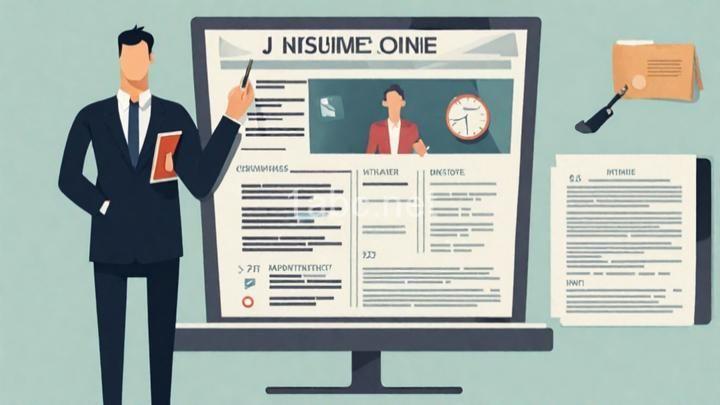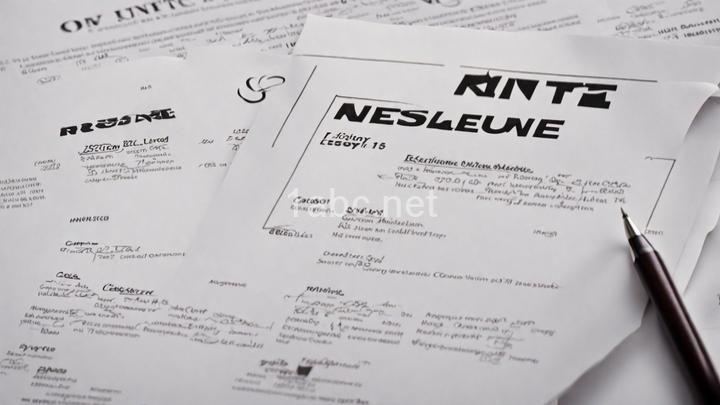Crafting a Standout Cover Letter: Essential Tips for Job Hunters

Introduction:
Hello, job hunters! Welcome to our blog post where we will be sharing some essential tips on crafting a standout cover letter. We understand the importance of a well-crafted cover letter in catching the attention of potential employers. So, whether you're a fresh graduate, a professional looking for a career change, or someone who simply wants to improve their cover letter writing skills, you've come to the right place. Let's dive in and discover the key elements that will make your cover letter shine!
I. Understanding the Purpose of a Cover Letter:
Before we delve into the nitty-gritty details, it's crucial to understand the purpose of a cover letter. A cover letter serves as an introduction to potential employers and gives you an opportunity to showcase your relevant skills and experiences. It allows you to personalize your application and stand out from the crowd. Remember, each cover letter should be tailored to the specific job application to maximize its impact.
II. Researching the Company and Position:
One of the first steps in crafting an outstanding cover letter is researching the company and position you are applying for. Take the time to gather information about the company's values, mission, and culture. This will help you align your cover letter with their expectations and demonstrate your genuine interest in the organization. Additionally, researching the position will enable you to highlight specific skills and experiences that match the job requirements.
III. Structuring Your Cover Letter:
Now that you understand the purpose and have done your research, let's discuss the recommended structure of a cover letter. A well-structured cover letter consists of four main sections: salutation, introduction, body paragraphs, and conclusion.
In the salutation, address the hiring manager or recruiter by name if possible. If you're unsure about the recipient's name, a simple "Dear Hiring Manager" will suffice.
The introduction should grab the reader's attention and provide a brief overview of who you are and why you're interested in the position. It's also a good idea to mention how you learned about the job opening.
The body paragraphs are where you will highlight your relevant experience, skills, and achievements. Use this section to demonstrate how your qualifications align with the job requirements. Consider using bullet points or subheadings to enhance clarity and organization.
Finally, the conclusion should summarize the main points of your cover letter and express your enthusiasm for the opportunity to further discuss your qualifications in an interview.
IV. Showcasing Your Skills and Experiences:
When it comes to showcasing your skills and experiences in your cover letter, it's important to strike a balance between being concise and impactful. Start by identifying the most relevant achievements and experiences that align with the job requirements. Use quantifiable results or specific examples whenever possible to provide tangible evidence of your capabilities. Remember, hiring managers are looking for candidates who can bring value to their organization, so make sure to highlight your unique selling points.
V. Customizing Your Cover Letter:
Customization is key when it comes to crafting a standout cover letter. It's essential to tailor each cover letter for different job applications. Take the time to carefully read the job posting and identify specific requirements or qualifications mentioned. Then, customize your cover letter to address those requirements and showcase how you meet them. This level of personalization will demonstrate your attention to detail and genuine interest in the position.
VI. Language and Tone:
The language and tone you use in your cover letter can make a significant impact on the reader. Aim to strike a balance between professional language and a friendly tone. While it's important to use industry-specific terminology and showcase your expertise, avoid using jargon that may confuse the reader. Instead, focus on expressing your enthusiasm and confidence in a clear and concise manner. Remember, your cover letter should reflect your personality and make a lasting impression.
VII. Proofreading and Editing:
Last but certainly not least, the importance of proofreading and editing cannot be overstated. After you have written your cover letter, take a break before proofreading it. This will allow you to review your work with fresh eyes and catch any errors or inconsistencies. Pay close attention to grammar, spelling errors, typos, and overall readability. It's always a good idea to seek feedback from trusted friends or mentors who can provide valuable insights and suggestions for improvement.
Conclusion:
Congratulations! You've reached the end of our guide on crafting a standout cover letter. We've covered the essential tips to help you create a cover letter that will catch the attention of potential employers. Remember, understanding the purpose of a cover letter, researching the company and position, structuring your cover letter effectively, showcasing your skills and experiences, customizing your cover letter, using the right language and tone, and proofreading and editing are all key elements in creating a compelling cover letter. We have confidence in your ability to apply these guidelines and create a cover letter that will set you apart from the competition. Good luck with your job search, and thank you for reading!
FREQUENTLY ASKED QUESTIONS
What is a cover letter and why is it important?
A cover letter is a document that accompanies your resume when applying for a job. It is an opportunity for you to introduce yourself to the employer and highlight your qualifications and skills that make you a good fit for the position.A cover letter is important because it allows you to personalize your application and showcase your enthusiasm for the job. It gives you the chance to explain why you are interested in the position and how your experiences align with the requirements of the job. It also provides an opportunity to address any gaps or discrepancies in your resume and elaborate on specific achievements or projects that are relevant to the job you are applying for.
In addition, a well-written cover letter can help you stand out from other applicants. It shows that you have taken the time and effort to tailor your application to the specific job and company. It also allows you to demonstrate your communication and writing skills, which are important in many professional roles.
Overall, a cover letter is an essential part of your job application as it allows you to make a strong first impression and highlight your qualifications and skills that make you a strong candidate for the position.
What should I include in my cover letter?
When writing your cover letter, there are several key elements you should include to make it effective. Here are some important things to consider:
-
Opening paragraph: Start your cover letter with a strong introduction that grabs the reader's attention and explains why you are interested in the position. Mention how you learned about the job and briefly highlight your qualifications.
-
Body paragraphs: Use the next few paragraphs to showcase your relevant skills, experiences, and achievements. Tailor this section to align with the job requirements and demonstrate how you can contribute to the company's success. Provide specific examples and quantify your accomplishments whenever possible.
-
Address the employer's needs: Show that you understand the employer's needs by addressing the specific requirements mentioned in the job posting. Explain how your skills and experiences make you a great fit for the role and how you can add value to the organization.
-
Show enthusiasm: Express your genuine interest in the position and the company. Highlight why you are excited about the opportunity and how you align with the company's mission and values.
-
Closing paragraph: End your cover letter by summarizing your key qualifications and reiterating your interest in the position. Thank the employer for considering your application and express your willingness to discuss your credentials further in an interview.
-
Professional tone and formatting: Maintain a formal tone throughout your cover letter and ensure it is well-organized and easy to read. Use a professional font and format, and proofread carefully to avoid any spelling or grammar errors.
Remember, your cover letter should complement your resume and provide additional context about your qualifications. It's your chance to make a strong first impression, so take the time to craft a compelling and personalized letter that highlights your strengths and suitability for the job. Good luck!
How long should my cover letter be?
The length of a cover letter can vary depending on the specific circumstances and the employer's requirements. However, as a general guideline, it is recommended to keep your cover letter concise and to the point. Aim for around three to four paragraphs, or approximately 250-400 words.In your cover letter, it's important to include relevant information about your skills, experiences, and qualifications that make you a strong candidate for the position. However, avoid including unnecessary details or repeating information that is already mentioned in your resume.
The first paragraph should introduce yourself and mention the specific position you are applying for. Use this opportunity to grab the reader's attention and briefly highlight your most relevant qualifications.
In the second and third paragraphs, provide specific examples of how your skills and experiences align with the requirements of the job. Use this space to demonstrate your knowledge about the company and show why you are a good fit.
Finally, in the last paragraph, express your enthusiasm for the opportunity and thank the employer for considering your application. Include your contact information and mention that you are available for an interview or to provide any additional information if needed.
Remember, the key is to strike a balance between providing enough information to showcase your qualifications and keeping the letter concise and engaging. Tailor your cover letter to each specific job application and make sure to proofread for any errors or typos before sending it off. Good luck!
Should I include my personal story in the cover letter?
Including your personal story in a cover letter can be a strategic decision depending on the type of position you're applying for and how relevant your personal story is to the job. Let's weigh the pros and cons to help you make an informed decision.One advantage of including your personal story is that it can help you stand out from other applicants. Sharing a meaningful experience or journey can make you more memorable to the hiring manager. It can showcase your unique qualities, values, and motivations, making a stronger case for why you would be a good fit for the role.
On the other hand, it's important to consider whether your personal story is directly relevant to the position you're applying for. If your story highlights skills, achievements, or experiences that are directly applicable to the job, it can provide valuable insights into your capabilities. However, if your personal story is unrelated or doesn't contribute to your qualifications, it may distract the reader from the main focus of your application.
It's also crucial to strike a balance between sharing enough information to make an impact and keeping your cover letter concise and focused. Remember that the primary purpose of a cover letter is to demonstrate your qualifications and convince the employer to invite you for an interview. If your personal story is too lengthy or overshadows your qualifications, it could hinder your chances of being considered for the position.
Ultimately, the decision to include your personal story in a cover letter depends on the specific circumstances of the job application. Consider whether it adds value to your application, aligns with the company's values, and enhances your overall candidacy. If you choose to include it, make sure to weave it seamlessly into your cover letter, highlighting its relevance to the position and emphasizing the skills and qualities it demonstrates.
Remember, the goal of your cover letter is to make a compelling case for why you are the best candidate for the job. By carefully considering the pros and cons of including your personal story, you can make an informed decision that maximizes your chances of success. Good luck with your application!



